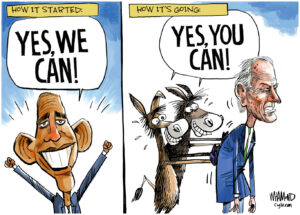Iowa ’08: Barack Obama Live
In his first dispatch from the scene of the upcoming caucuses, Boyarsky gets a look at Barack Obama in action as the Democratic presidential hopeful delivers a speech in Des Moines touching on foreign policy and the issue of experience in office.
DES MOINES, Iowa — The most challenging and confounding part of a political correspondent’s job is to pick out something important from the chaff of daily news.
I was reminded of this when I reported to the press desk at the Holiday Inn for a credential that would admit me to Sen. Barack Obama’s speech on foreign policy. I had not sought such a badge since the 1996 Democratic and Republican conventions, and I was curious to see how the political reporting game had changed since then.
Not much, really. Technically, communications are better, with e-mail, the Internet, wireless computers, Blackberries and Treos. But the work is the same. The reporting crew traveling on the Obama bus had a part of the press section reserved for them. They arrived with the same air of sorority-fraternity insider privilege that my contemporaries and I had when we were on the bus many years ago.
And they had the same task I did then — trying to find hard news in a speech that they had undoubtedly heard several times while accompanying Obama around this state.
Once I found a space and the program began, I had my first look at Obama in person. He is better live than on television, yet he was no different from what I had expected. He is both warm and distant. His tone is calm and cool. He doesn’t pander to the audience. Rather, he drew the 300-plus men and women in the room to him with distinctive mannerisms — his chin raised when he is making a point, his hands constantly on the move with graceful gestures that emphasize his points. Afterward, when he shook hands with people on his way out, he connected with them, listening to what they said, taking time with each person.
His speech wasn’t especially new to me. The Internet, television and four daily newspapers keep me informed in my home office. But toward the end, he said something that prompted me to underline and mark it in my notebook: “A long résumé doesn’t guarantee good judgment.” He had said about the same thing in the fall, but he was talking about Vice President Dick Cheney and Donald Rumsfeld, President Bush’s former defense secretary.
Now Obama is under attack from Hillary Clinton’s campaigners — her husband and, recently, one of her key celebrity supporters, ex-Lakers star Magic Johnson — for being inexperienced. In another part of the state, with the Clintons standing by, the basketball legend said, “She is the only one with 30 years of experience.” When someone corrected him, he said, “Thirty-five, all right.”
So when Obama dragged out the résumé line, I thought, given the context, it had real resonance. He was making a big effort to show he was qualified to be commander in chief.
That obviously was the motive of a panel discussion of foreign policy that preceded his speech. One panelist was Tony Lake, Clinton’s national security adviser. Another was Susan Rice, a National Security Council official and assistant secretary of state in the Clinton administration. Adding military heft was a retired Air Force general, Scott Gration, who had held top policy posts and flown 274 combat missions over Iraq.
In his speech and in the Q & A session that followed, Obama was fairly detailed about his foreign policy.
I still didn’t like what he said about the war, calling for just a phased removal of combat troops from Iraq, and more emphasis on Afghanistan. This sounds increasingly like the British Empire during Victorian times, when troops were perpetually stationed in colonial India so long that their service became an accepted way of life.
I did approve of what he said about Israel and the Palestinians. Start with a two-state solution, with Israel — “a stalwart ally” — assured of uncompromised security. The Palestinians’ demand for a right of return cannot be allowed to threaten Israel as a Jewish state, but Israel must acknowledge that a Palestinian state must be “cohesive and able to function.”
Obama showed a restrained bit of humor when a man demanded a short and specific answer to a question about China. “I feel like I am in class,” Obama said. “Are you a professor?”
He was unclear when someone in the audience asked his view on funding President Pervez Musharraf of Pakistan. He said that he wouldn’t give Pakistan military aid unless it is “directly related” to fighting terrorism. Since Musharraf says that fighting terrorism is all he does — even if it means jailing protesting lawyers — I didn’t see that Obama would bring a huge change in that area.
But I was impressed with the details of his answer on Sudan and Darfur as he explained why we and other nations must get involved in sending a stronger force there to protect the refugees, convince the Sudanese not to resume civil war and assign a special envoy there.
But I still hadn’t answered the age-old journalistic question: “What’s the lede?” The lede is the first paragraph of a story, the one that sets the tone, shapes the organization and helps determine the headline of a hard news story. I felt sorry for the reporters struggling to figure out the answer after covering an event without a hard news lede.
I had watched something important that would probably disappear in the campaign abyss. Here, among the thoughtful questions and answers, Obama displayed an impressive command of details, even though I didn’t like all of his answers. And, cool as he is, he showed he could connect with people.
This was at least a hint of what Obama would bring to the White House, unfiltered by the restrictions of a television debate or the mainstream media’s constant demand for news with an edge. It’s too bad so few of us saw it.
Your support is crucial...As we navigate an uncertain 2025, with a new administration questioning press freedoms, the risks are clear: our ability to report freely is under threat.
Your tax-deductible donation enables us to dig deeper, delivering fearless investigative reporting and analysis that exposes the reality beneath the headlines — without compromise.
Now is the time to take action. Stand with our courageous journalists. Donate today to protect a free press, uphold democracy and uncover the stories that need to be told.






You need to be a supporter to comment.
There are currently no responses to this article.
Be the first to respond.